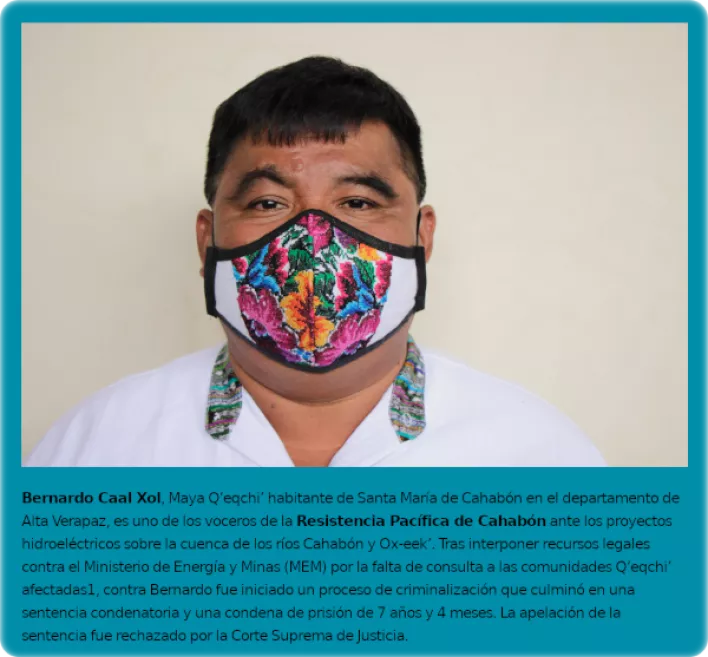“If I fight for the mountain it is because we are the living river. The river speaks, and our mountain nourishes us. If they destroy it, we will have to leave because we ourselves are a part of nature.” - Dilma Cruz, human rights defender from the Guapinol community.
On International Women Human Rights Defenders (WHRD) Day, 29 November, we want to pay tribute to the role of women who advocate for the environment around the world by highlighting the struggles of the women of the Guapinol community. In this community, located in the municipality of Tocoa in the department of Colón, it is specifically women who have led the communities’ resistance against the threat that extractivism poses to community life. Behind the most visible evidence of the community’s struggle – the criminalisation of eight men from the community, who were later recognised as finalists for the Sakharov Prize – has been the tireless work of the women of the community.
Their defence of the river and of the Montaña de Botaderos Carlos Escaleras National Park takes place within a context of deeply-rooted economic and structural discrimination against women. It is believed that 2016 and 2017 have been the most violent years for women defenders in Honduras: the Women Human Rights Defenders Network reported 1,230 reported attacks and 5 feminicides. In 2020, Front Line Defenders reported the murders of 44 women defenders in Latin Ameria, 69% were women defending indigenous peoples’ rights, land rights and the environment. In 2021 alone, 67 women were subjected to intimidation, aggression and criminalisation of their work as defenders. Today, half of all women human rights defenders are subject to attacks and threats.
The resistance of women defenders in Guapinol

The women in Guapinol have a deep connection to the environment, it is their lifeblood. In 2013 they began to notice that the river water was dirty. Juana Zuñiga, one of the community leaders, recalls that “in the blink of an eye the river was already damaged.” As time passed, they realised that the contamination came from the installation of an iron oxide mining project led by Inversiones Los Pinares, part of the EMCO group. The project affects the protected area of the Montaña de Botaderos Carlos Escaleras National Park and all 34 rivers that flow from within its limits, including the San Pedro, Guapinol and Tocoa rivers which are tributaries of the Aguán, one of the most important rivers in Honduras.
In response to the situation, the community began to organise and created the Municipal Committee for the Defence of the Common and Public Goods of Tocoa. By 2016, in order to make their voices heard by the mayor of Tocoa, they had staged demonstrations, road blockades, an 11 day protest in front of the town hall, the collection of 4,000 signatures in favour of a community consultation, and filed constitutional appeals and criminal reports.
According to the women defenders, in April 2018 and the following 3 months, the water reaching homes of several communities in the area was sludgy and contaminated, which meant that it could not be used for household purposes. This led around 140 people from the affected communities to set up the peaceful camp “For Water and Life” in Guapinol on 1 August 2018, a process which would exist for 88 days. Juana Zuñiga tells us that “women were in charge of the camp: the men took turns keeping guard of the perimeter, and we women organised ourselves into three groups to cook and take care of our children”.
On 27 October 2018, military, police and private security forces were deployed to the area and violently evicted the people in the camp. Dilma Cruz recalls that “one day before the eviction of the camp, we saw cars and police passing by. As they’d already tried to evict us several times but never succeeded, we thought that this time it would be the same. We were ready for them and went to our houses to get scarves and vinegar [to protect from the tear gases used by the police]. That day they evicted us as if we were criminals. They threw gas and stones at us. We had to run away. There were pregnant women with children. We didn’t deserve that. Water is life for us”.
That same year, 32 people from the camp were indicted and in January 2019, the judge declared preventive detention for eight defenders for the crimes of unjust deprivation of liberty, aggravated arson and illicit association. Two of the arrested men were the partners of Juana Zuñiga and Dilma Cruz. Juana Zuñiga: “With the arrest of my partner it was very difficult, I felt defeated. We were fighting against a dictator and a government that does not protect people who defend the environment. The men were imprisoned but they didn’t mind being in jail for defending the river, and I quickly got my strength back too. We knew that machismo and corporate powers were gaining more power: they even launched smear campaigns against us women for always attending the court hearings.”
Similarly, Dilma Cruz says that “my situation changed completely. Having to go to see my partner in Olanchito prison was extremely difficult. People from the company accused us of being ‘shouty’ women who wouldn’t let them work. In spite of that, I became stronger. They thought that scared women wouldn’t speak out”. Juana Zúñiga stated in a forum that “they made us invisible during the whole trial: although there were more women than men in the camp, they only accused the men. In the protests it was always the women who took the lead”.
The eight defenders were in prison for 914 days between their arrest and early 2022, during which time their families had limited and often restricted access to the Olanchito prison. Juana Zuñiga recalls that “when I went to the prison I felt terrible. They harassed me when they passed the scanner, I was searched by a woman but I was always surrounded and watched by soldiers”.
Current situation
At the beginning of 2022, the eight defenders were provisionally released. However, the possibility of their being re-criminalised remains. Almost a year after their release, insecurity is one of the greatest risks faced by the people of the community of Guapinol, especially the women. Juana Zúñiga believes that the risks are greater for women: “In spite of the threats, they will not silence us. We have accepted the danger so far and we know that we are strong. They have threatened to burn down my house, but I don’t want to leave my home and my family. I am fighting to be with my daughters and to be free. I want to feel more secure, but I am concerned because we are up against a big businessman, who is constantly monitoring everything. We are fighting despite the threats because we want our rivers to run freely for generations to come.”
To date, the extractive and mineral-processing activities have not ceased. A fact that, according to both defenders, continues to cause significant environmental damages and which has had repercussions on the care practices of the women of the community who use the river’s water for their daily economic and social activities, not to mention the changes it has produced in the lives of the community as a whole. Dilma Cruz shares that “the community is no longer the same. It used to be a peaceful community, but we can no longer be at ease in our own territory, the people who work in the mine are constantly watching us”.
In Honduras, being a woman human rights defender is extremely dangerous. The majority of women human rights defenders (67%) focus their efforts on defending women’s rights and are also involved in a diversity of areas including land, environment, water, labour rights, and anti-mine rights, among others. Women defenders are on average 43 years old, and those who defend land and territory are the most attacked. This work carries risks for themselves, the causes they defend and for their families. Women defenders face a variety of risks, threats and abuses: 45% of women reported death threats during their time as a defender or leader, with 32% reporting cases of verbal abuse and insults. Their risk is heightened due to additional discrimination that women environmental defenders face on account of their perceived weak or fragile status as women which often leads to further threats and stigmitisation.
